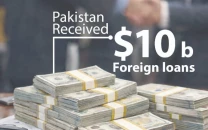Private power producers warn of more blackouts
Place blame on government for not resolving the circular debt issue.

The government still has to pay the total current outstanding bill of Rs57.48 billion to eight IPPs namely Atlas, Nishat Power, Halmore, Sapphire, Liberty, Orient, Saif and Nishat Chunian Power. PHOTO: FILE
In an interview with The Express Tribune, IPPs Advisory Council chairman Abdullah Yousaf said the first priority of the next government should be the payment of outstanding dues to IPPs to maintain power supply at current levels or reduce load-shedding to some extent.
The government still has to pay the total current outstanding bill of Rs57.48 billion to eight IPPs namely Atlas, Nishat Power, Halmore, Sapphire, Liberty, Orient, Saif and Nishat Chunian Power. Considering the amount, it is evident that the eight cash-strapped IPPs cannot produce more power than 1,600 megawatts (MW).
It will be crucial for the next government to supply gas to power producers who are efficient, so it can be translated into maximum power generation, which Yousaf believes is a simpler formula. Uninterrupted fuel should be supplied to IPPs who can produce power at cheaper rates than generation companies (Gencos), he added.
Under the policy framed in 2002, per unit fuel costs recorded by IPPs on oil-based power plants stood at Rs14.05 against Rs21.04 reported by Gencos. This could have led to savings of Rs6.94 on every unit produced if the economic order was followed. Moreover, gas-based IPPs produced a unit of power Rs2.36 cheaper than Gencos.
Previous governments did not pay heed on availing the aforementioned option, hence putting immense pressure on national finances and incurring huge losses on account of efficiency.
Over the five-year period, performance of distribution companies (DISCOs) and Gencos had deteriorated and the steps recommended by international lenders on account of economic reforms were never implemented.
“Despite the fact that IPPs save billions of rupees on behalf of the government through their efficient plants, they were suffering the most due to the payment crisis on part of the government.”
Published in The Express Tribune, May 10th, 2013.
Like Business on Facebook to stay informed and join in the conversation.
















COMMENTS
Comments are moderated and generally will be posted if they are on-topic and not abusive.
For more information, please see our Comments FAQ